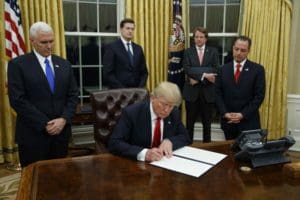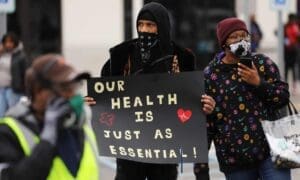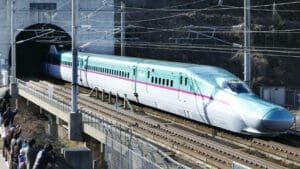 The coronavirus pandemic has moved non-essentials employees to their home offices for the last few weeks and for the foreseeable future. This has dramatically increased the popularity of virtual conferencing app Zoom, as employees, students, and friends look to remain connected in this time of isolation. Just how popular has the app become? Currently, it is the most popular Apple and Android app in the world, and its stock price has more than doubled since late January. And what kind of impact does all this virtual socializing make? Well, Walmart has reported an increase in its sales of tops, but not pants, during the coronavirus lockdown. People still want to look good while attending virtual conferences but know they can remain a bit more casual from the waist down, as most video conferencing apps show participants from the chest up. So, the rise in the sales of tops, but not bottoms, isn’t overly surprising; however, it is certainly amusing. And now on to this week’s logistics news,
The coronavirus pandemic has moved non-essentials employees to their home offices for the last few weeks and for the foreseeable future. This has dramatically increased the popularity of virtual conferencing app Zoom, as employees, students, and friends look to remain connected in this time of isolation. Just how popular has the app become? Currently, it is the most popular Apple and Android app in the world, and its stock price has more than doubled since late January. And what kind of impact does all this virtual socializing make? Well, Walmart has reported an increase in its sales of tops, but not pants, during the coronavirus lockdown. People still want to look good while attending virtual conferences but know they can remain a bit more casual from the waist down, as most video conferencing apps show participants from the chest up. So, the rise in the sales of tops, but not bottoms, isn’t overly surprising; however, it is certainly amusing. And now on to this week’s logistics news,
- US plans to stop collecting import tariffs for three months
- Amazon in the news:
- UPS, FedEx suspend service guarantees citing coronavirus impact
- Netherlands recalls 600,000 face masks from China due to low quality
- Bullet-train home delivery ready for service
- Mondelēz makes deforestation progress in cocoa supply chain
- US senators urge coronavirus delay to June 1 USMCA trade deal start date
- US-Canada trucker border crossings plunge
 According to Trump administration officials, the US is getting ready to suspend the collection of import tariffs for three months. The driver behind the move is to give US companies financial relief during the coronavirus pandemic. Last week, US Customs and Border Protection said that it would provide temporary delays for customs duties on a case-by-case-basis. However, this week that offer was rescinded as the President put the tariff suspension in place. Even though customs duties will be suspended, there will be no formal changes to the tariff policy and companies will still be liable for the tariffs at a later date. The official date has yet to be determined.
According to Trump administration officials, the US is getting ready to suspend the collection of import tariffs for three months. The driver behind the move is to give US companies financial relief during the coronavirus pandemic. Last week, US Customs and Border Protection said that it would provide temporary delays for customs duties on a case-by-case-basis. However, this week that offer was rescinded as the President put the tariff suspension in place. Even though customs duties will be suspended, there will be no formal changes to the tariff policy and companies will still be liable for the tariffs at a later date. The official date has yet to be determined.
 Earlier this week, warehouse, delivery, and retail gig workers in the US went on strike to call attention to safety and wage concerns for people laboring through the coronavirus crisis. Among the strikers were employees from an Amazon warehouse in Staten Island, NY as well as employees from online grocery delivery company Instacart. Amazon has since fired the employee who organized the strike, Chris Smalls. Strikers at the JFK8 warehouse in Staten Island demanded Amazon temporarily shut down the large facility for cleaning, after reports of multiple employees testing positive for Covid-19. Amazon said later it fired an employee who helped organize the action for alleged violations of his employment, including leaving a paid quarantine to participate in the demonstration. On Tuesday afternoon New York’s mayor, Bill de Blasio, said he had ordered the city’s human rights commissioner to investigate the dismissal.
Earlier this week, warehouse, delivery, and retail gig workers in the US went on strike to call attention to safety and wage concerns for people laboring through the coronavirus crisis. Among the strikers were employees from an Amazon warehouse in Staten Island, NY as well as employees from online grocery delivery company Instacart. Amazon has since fired the employee who organized the strike, Chris Smalls. Strikers at the JFK8 warehouse in Staten Island demanded Amazon temporarily shut down the large facility for cleaning, after reports of multiple employees testing positive for Covid-19. Amazon said later it fired an employee who helped organize the action for alleged violations of his employment, including leaving a paid quarantine to participate in the demonstration. On Tuesday afternoon New York’s mayor, Bill de Blasio, said he had ordered the city’s human rights commissioner to investigate the dismissal.
As the coronavirus outbreak has shuttered brick and mortar stores, increased online commerce, and decimated earning potential for gig economy workers, Amazon is looking to keep hiring. The company is teaming up with Lyft on recruiting the ride-hailing company’s drivers to deliver packages and groceries. In an email to Lyft drivers Friday, the company referred them to work opportunities at Amazon as grocery shoppers, warehouse workers, or delivery people “as a way to earn additional income right now.” Amazon has already announced plans to hire and additional 100,000 workers in various positions, as well as raise the minimum wage by $2 an hour for employees. Declines in the ride-hailing business are sharp; recent estimates put a drop in fare prices at as much as 11 percent and demand at about 20 percent.
 Citing the impact of coronavirus, UPS and FedEx have suspended service guarantees.FedEx suspended its global Money Back Guarantee as of March 24 for all FedEx Express, FedEx Ground, FedEx Freight, and FedEx Office services until further notice. UPS suspended its service guarantee indefinitely for US originating shipments March 24 and all other origins March 26. UPS and FedEx warn in their customer notices that shippers need to check with destination addresses to ensure they are open and avoid delivery exceptions. These service adjustments show the unpredictable nature of supply chains while dealing with the COVID-19 outbreak.
Citing the impact of coronavirus, UPS and FedEx have suspended service guarantees.FedEx suspended its global Money Back Guarantee as of March 24 for all FedEx Express, FedEx Ground, FedEx Freight, and FedEx Office services until further notice. UPS suspended its service guarantee indefinitely for US originating shipments March 24 and all other origins March 26. UPS and FedEx warn in their customer notices that shippers need to check with destination addresses to ensure they are open and avoid delivery exceptions. These service adjustments show the unpredictable nature of supply chains while dealing with the COVID-19 outbreak.
 Across the news we have been hearing about a severe shortage of N-95 face masks. The New England Patriots team plane just took a trip to China to bring back over 1.2 million of the face masks. But what happens if the masks are defective? That’s what happened in the Netherlands as Dutch officials have recalled 600,000 face masks manufactured in China because they did not meet quality standards. Half of the shipment of 1.3 million face masks had already been distributed to doctors and nurses treating the most critical Covid-19 patients, the government said. According to the Dutch Ministry of Health, Welfare and Sport, the masks did not fit well, and the filters did not function properly. The country is now in scramble mode as it tries to find new supplies.
Across the news we have been hearing about a severe shortage of N-95 face masks. The New England Patriots team plane just took a trip to China to bring back over 1.2 million of the face masks. But what happens if the masks are defective? That’s what happened in the Netherlands as Dutch officials have recalled 600,000 face masks manufactured in China because they did not meet quality standards. Half of the shipment of 1.3 million face masks had already been distributed to doctors and nurses treating the most critical Covid-19 patients, the government said. According to the Dutch Ministry of Health, Welfare and Sport, the masks did not fit well, and the filters did not function properly. The country is now in scramble mode as it tries to find new supplies.
 Japan’s first high-speed rail link opened 56 years ago. And from the beginning, there were thoughts about using the bullet trains for freight operations as well. However, the added cost of setting up cargo terminals and freight carriages put the plans out of mind. Until now that is. With Japan facing a labor shortage of long-distance truck drivers, officials are now looking at using existing infrastructure to send parcels and passengers in the same train cars. Delivery company Sagawa Express is teaming up with Hokkaido Railway, a Japan Railways group company, to launch a new delivery service using vacant seats on bullet trains. Currently, Sagawa uses ferries to transport parcels between Japan’s largest island, Honshu, and the main northernmost island of Hokkaido. The ferries carry trucks and drivers for afternoon deliveries. The bullet trains will enable delivery of parcels in the morning of the following day. Tests could begin as early as this month.
Japan’s first high-speed rail link opened 56 years ago. And from the beginning, there were thoughts about using the bullet trains for freight operations as well. However, the added cost of setting up cargo terminals and freight carriages put the plans out of mind. Until now that is. With Japan facing a labor shortage of long-distance truck drivers, officials are now looking at using existing infrastructure to send parcels and passengers in the same train cars. Delivery company Sagawa Express is teaming up with Hokkaido Railway, a Japan Railways group company, to launch a new delivery service using vacant seats on bullet trains. Currently, Sagawa uses ferries to transport parcels between Japan’s largest island, Honshu, and the main northernmost island of Hokkaido. The ferries carry trucks and drivers for afternoon deliveries. The bullet trains will enable delivery of parcels in the morning of the following day. Tests could begin as early as this month.
 Chocolate companies around the world have been pledging to eliminate deforestation from their supply chains. One of the leaders in the space has been Mondelēz, owner of Cadbury and Toblerone. The company has announced that as part of its efforts to combat deforestation, it has mapped out almost all of its cocoa farms within its chocolate supply chain across Ghana, Côte d’Ivoire, and Indonesia. The efforts to map its cocoa farms comes as part of the company’s efforts to ensure its cocoa is sourced from areas that are not protected. Mondelēz has made significant strides to reduce or eliminate deforestation and will release a full progress report shortly.
Chocolate companies around the world have been pledging to eliminate deforestation from their supply chains. One of the leaders in the space has been Mondelēz, owner of Cadbury and Toblerone. The company has announced that as part of its efforts to combat deforestation, it has mapped out almost all of its cocoa farms within its chocolate supply chain across Ghana, Côte d’Ivoire, and Indonesia. The efforts to map its cocoa farms comes as part of the company’s efforts to ensure its cocoa is sourced from areas that are not protected. Mondelēz has made significant strides to reduce or eliminate deforestation and will release a full progress report shortly.
A bipartisan group of 19 US senators urged the Trump administration to push back the planned June 1 start date for the new US-Mexico-Canada (USMCA) trade pact, saying the short lead time would add to pressures on U.S. companies due to the spread of the coronavirus. In a letter to US Trade Representative Robert Lighthizer, the senators said the new trade deal, which replaces the 26-year-old North American Free Trade Agreement, should not enter into force until Mexico and Canada are in full compliance with their commitments. The Mexican Automotive Industry Association on Monday urged its government to seek a delay in the regional automotive rules until 2021.
 And finally, US – Canada trucker border crossings have plunged. When compared to 2019, 24 percent fewer truck drivers entered Canada from the USA last week. This is likely a sign that coronavirus is impacting the flow of goods between the North American neighbors. The Canada Border Service Agency (CBSA) said on Tuesday that 88,290 truck drivers entered Canada from its land border crossings with the US from March 23 to 29. During the same week in 2019, 115,239 truckers entered Canada. These statistics are from the first full week since the US and Canada halted nonessential travel between the countries to curb the spread of the pandemic. The restriction does not apply to trucking.
And finally, US – Canada trucker border crossings have plunged. When compared to 2019, 24 percent fewer truck drivers entered Canada from the USA last week. This is likely a sign that coronavirus is impacting the flow of goods between the North American neighbors. The Canada Border Service Agency (CBSA) said on Tuesday that 88,290 truck drivers entered Canada from its land border crossings with the US from March 23 to 29. During the same week in 2019, 115,239 truckers entered Canada. These statistics are from the first full week since the US and Canada halted nonessential travel between the countries to curb the spread of the pandemic. The restriction does not apply to trucking.
That’s all for this week. Enjoy the weekend and the song of the week, ZZ Top’s Sharp Dressed Man.
















